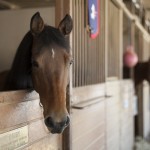BURBANK — State officials confirmed Nov. 4 that two ill horses at the Los Angeles Equestrian Center have tested positive for equine herpesvirus-1 (EHV-1) after they had returned Oct. 30 from a horse show in Las Vegas, Nev.
One of the horses, a 5-year-old Saddlebred, was euthanized Nov. 3 because of the severity of its clinical signs, the California Department of Food and Agriculture reported.
was euthanized Nov. 3 because of the severity of its clinical signs, the California Department of Food and Agriculture reported.
Out of an abundance of caution, the CDFA has issued a quarantine for exposed horses at the facility and has implemented enhanced biosecurity measures. All exposed horses will have temperatures taken twice daily and will be observed for clinical signs compatible with EHV.
While the CDFA investigates the source of the virus and monitors for any potential spread, officials and L.A. Equestrian Center staff encourage owners of horses exposed to the area to follow basic protocols in the days ahead:
* honor any quarantines or instructions from CDFA staff
* avoid direct horse-to-horse contact
* monitor your horse for clinical signs of disease and report a temperature over 102 degrees to a veterinarian
* avoid horse-to-human contact
* avoid sharing equipment, unless thoroughly cleaned and disinfected between uses
* avoid use of communal water sources
The CDFA did not specify the horse show. The 72nd Annual California Saddle Horse Breeders’ Association Futurity Horse Show was held at South Point Hotel in Las Vegas on Oct. 27-29.
The L.A. Equestrian Center acted quickly. On Saturday, Oct. 29, two horses in “A Barn” were reported with a temperature, and after treatment by a veterinarian, both a nasal swab and blood work were taken. Both horses tested negative.
Late Wednesday afternoon, the two horses in “A Barn” were reported with clinical signs and treated by the veterinarian. One was moved to the quarantine and one remained in its stall. The one in its stall, the 5-year-old Saddlebred, succumbed to its ailments and was euthanized Thursday.
As a precaution, facility staff is cleaning any stall of a horse indicating a fever with a designated set of cleaning tools and by a designated attendant dressed appropriately in disposable overalls and booties. The equipment is sanitized with a bleach solution after each cleaning.
Horse owners are asked to report any fever of their horse to their veterinarian as well as the LAEC, identifying veterinarian, location, date and temperature.
Herpesvirus is highly contagious among horses and can cause a variety of ailments in equines, including rhinopneumonitis (a respiratory disease usually found in young horses), abortion in broodmares, and myeloencephalopathy (the neurologic form). In many horses, fever is the only sign of EHV-1 infection, which can go undetected.
In addition to fever, other common signs of EHV-1 infection in young horses include cough, decreased appetite, depression, and a nasal discharge. Pregnant mares typically show no signs of infection before they abort, and abortions usually occur late in gestation (around eight months), but can be earlier. Abortions can occur anywhere from two weeks to several months following infection with EHV-1.
Horses with the neurologic form usually have a fever at the onset of the disease and might show signs of a respiratory infection. A few days later, neurologic signs such as ataxia (incoordination), weakness or paralysis of the fore- and hind limbs, urine retention and dribbling, loss of tail tone, and recumbency (inability to rise) develop.
The last incident of a fatal EHV-1 case in California was in Riverside County last February, when a 14-year-old polo mare displayed acute neurologic signs and was euthanized. Necropsy results confirmed the non-neuropathogenic strain of EHV-1. Seventy horses were exposed.
MORE ONLINE: http://bit.ly/611B_EHV-1
November 6th, 2016 at 7:25 am
Thank you for up date helps all of us horse owner’s be observant .
November 7th, 2016 at 10:19 am
You are welcome, Cindyann. Thank you for counting on us!